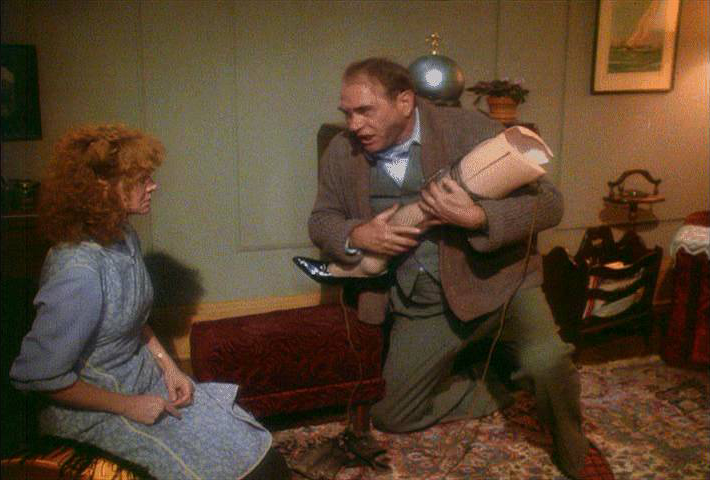It’s 12:05PM. I was supposed to train at 12:00PM. I don’t know when I’ll drag myself downstairs to my home gym. I will. Eventually. I won’t be jumping out of my seat with a heart full of motivation. But I’ll get shit done. You want to change. Lose fat. Build muscle. You have so much self-discontent your psyche is A Christmas Story leg [...]
It’s 12:05PM. I was supposed to train at 12:00PM. I don’t know when I’ll drag myself downstairs to my home gym. I will. Eventually. I won’t be jumping out of my seat with a heart full of motivation. But I’ll get shit done.
You want to change. Lose fat. Build muscle. You have so much self-discontent your psyche is A Christmas Story leg lamp fragile.

I would know. I hated looking in the mirror. Here’s where I’m supposed to write about something funny to lighten the mood. Oops. I was never one to recognize and respond to stock social cues for the sake of custom.
Yet your brain, the same one filled with massive self-discontent, can’t propel you to do what you need to do to get to where you want to go. The irony is agonizing.
People use motivation as a scapegoat. I’m just not motivated. I want to be more motivated. How do I become more motivated? Where do I find motivation?
You won’t find motivation here, nor will you find out how to become more motivated (or create more motivation). Motivation is for suckers. You don’t need motivation. You need to get shit done.
The view source function on “look better, move better, feel better” reveals underlying behavioral code.
“I want to lose fat” really means “I want to change my behaviors. I want to start doing things that’ll make me lean, I want to stop doing things that’ll make me fat.”
But does it really mean that? Is that how you really feel?
Probably not. Else you’d just get shit done.
You don’t need motivation to grab a beer out of the fridge because you want the beer.
The dissonance you experience comes from wanting the outcome, but not wanting to perform the behaviors that’ll lead to the outcome.
This is why change is hard.
I wonder why I do what I do. Often. I think about giving up and shoving my face with muck until I die (happily and well fed) of type 2 diabetes. I bounce back and forth between ripped and eh because I’ve yet to kill the inner fat kid inside of me.

I do this because you often lose when you try to fool your subconscious.
People without a lot of self-confidence will crash and burn if they use positive reinforcement techniques. They can’t resolve the cognitive dissonance it creates.
I’m awesome! No. Wait. I’m not. I’m a piece of shit. An awesome piece of shit? Fuck. Why am I even thinking this? I’m a great person. I need to be confident. I hate myself.
You want the outcome, but you don’t want to perform the behaviors that’ll lead to the outcome. It’s okay. What’s not okay is expecting motivation to seep out of this situation.
Motivation is multifaceted.
Your interest in both the behaviors and the expected outcome influence motivation. Your feelings about the behavior from a reward and punishment standpoint influence motivation.
We’re smelly moist machines with ancient software that programs for risk aversion. From an evolutionary standpoint, humans prone to harder, risky, discomforting things were the ones that stuck their head into a noisy bush where a black bear was having sex. And if there’s one thing I know about black bears, it’s that they don’t take kindly to interrupted sex. (I know nothing about black bears.)
Risky humans didn’t live long enough to pass down copies of their genes. We tend to avoid punishment and pain. We tend to seek pleasure and reward. The more pain, punishment, and discomfort you associate towards a behavior (the act or the outcome), the less motivated you’ll be.
Your ability influences motivation. You’ll be more motivated to do something you’ve already proven you can do. This ties into expectancy, which is a biggie.
Do you expect your efforts to make a difference? Your past matters.
You tell yourself, “I’ll start Monday!” And you do. Hardcore. You feel fresh. You feel good. Tuesday comes, and you hang on. Wednesday, you feel a little…off. Your grip starts to fail. Thursday, well, uhh, you see, something came up, and, uhh, well, I just couldn’t.
“I’ll start Monday!”
You can only start so many Mondays with motivation. Before long, even if you’re consciously ready to (finally) be consistent and get shit done, your subconscious identifies the charade.
“Oh, great. You’re doing this song and dance again. I know what this is all about. You’re going to quit two days later. No need to get excited. It’s just a passing phase.”
Your subconscious expects another failure. Your motivation is low.
Another influence to motivation is timeliness. The longer it takes to see or own a result, the less motivation you’ll have. Your brain gets hooked easier when there’s immediate feedback. Too bad in the Land of Bod, things don’t happen fast (except injuries).
I’m sure motivation is even more multifaceted, but I’ve done my job and pretended to know enough. Time to move on.
You can see why your motivation is low. You can also see what wanting more motivation really means.
It means you want your perception to be flipped upside down.
Ti esrever dna ti pilf nwod gniht ym tup I.
Call it an epiphany. A behavior formerly seen as positive, happy, or safe (or even neutral) becomes something very very very very very negative. Or the opposite happens: a negative behavior becomes a positive.
I had an epiphany when I was eighteen. I was eating a (second) second bag of brown sugar Pop-Tarts (no icing, please) right after eating a bunch of pizza in my college’s cafeteria.
I cracked open the bag I thought, “What the hell am I doing? This isn’t going to get me the body I want. Something has to change.”
Things have never been the same since.
Epiphanies are awesome, but they can’t be consciously triggered. You can putz around for years and end up empty handed.
I guess if you maintain interest long enough, you’re more likely to have an epiphany. Someone that’s been scouring the Internet (and books) for ten years straight years, immersing themselves in health and fitness, is more likely to have an epiphany than someone that’s only held interest for one day
If you want to float in a purgatory and cross your fingers for an epiphany, be my guest. Or you can do the smart thing and flush your reliance on motivation down the toilet.
Motivation isn’t a static entity you either have or don’t have. It ebbs and flows because it’s connected to your mood and your thoughts.
I can’t watch the news. It’s too depressing. Child Dies From Parental Neglect. What? How can I focus when people are dying? Wait. Oh no. It’s one of those Sarah McLachlan dog commercials.
I WILLLL REEMMMMEMMBBEERRRR YOUUUUU.
I’m going to die anyway. Who cares what I look like. It doesn’t matter. Just inject bacon grease into my intravenously. Get it over with quicker. I hate everything.
You can (should) stop watching the news. Reduce your depressing input. But you can’t hide from everything. Maybe work upsets you. Or someone at work. Or someone you interact with during your day on the way to work. Even family can crawl under your fingernails.
I’m not permanently positive Chris Traeger. You probably aren’t either. Despite the world being filled with miles of beauty in each direction, it only takes is one tiny input to crumble a castle of resolve that takes days (years) to build.
There are too many external variables that influence motivation for it to be of reliable use. It’s like standing on a wobble board because you don’t want to move.
There’s a better way.
→ Click here to read Part 2